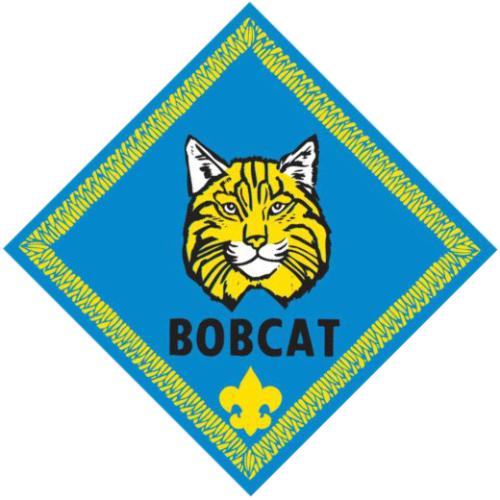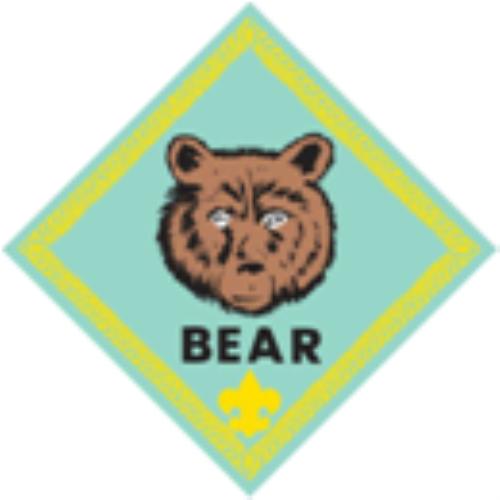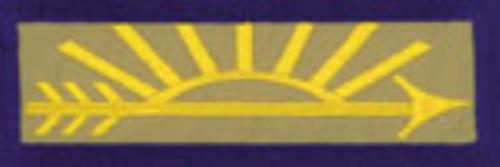|
|
|
|
|
|
|
|
|
|
|
|
|
 |
 |
 |
 |
|
 |
 |
 |
 |
|
|
Bobcat
 |
Boys who join the Cub Scout program on June 1, 2015, or later must complete the Bobcat requirements listed below before earning the rank badge for their school or birth year.
- Learn and say the Scout Oath, with help if needed.
- Learn and say the Scout Law, with help if needed.
- Show the Cub Scout sign. Tell what it means.
- Show the Cub Scout handshake. Tell what it means.
- Say the Cub Scout motto. Tell what it means.
- Show the Cub Scout salute. Tell what it means.
- With your parent or guardian, complete the exercises in the pamphlet How to Protect Your Children From Child Abuse: A Parent's Guide
|
Tiger
 |
Tiger Cubs is for boys who are in First Grade and/or seven (7) years old. To receive the Tiger Cub rank, the Tiger Cub must:
- Complete each of the following Tiger required adventures with your den or family:
- Backyard Jungle
- Take a 1-foot hike. Make a list of the living things you find on your 1-foot hike.
- Point out two different kinds of birds that live in your area.
- Be helpful to plants and animals by planting a tree or other plant in your neighborhood.
- Build and hang a birdhouse.
- With your adult partner, go on a walk, and pick out two sounds you hear in your “jungle.”
- Games Tigers Play
- Do the following:
- Play two initiative or team-building games with the members of your den.
- Listen carefully to your leader while the rules are being explained, and follow directions when playing.
- At the end of the game, talk with the leader about what you learned when you played the game. Tell how you helped the den by playing your part.
- Make up a game with the members of your den.
- Make up a new game, and play it with your family or members of your den or pack.
- While at a sporting event, ask a participant why he or she thinks it is important to be active.
- Bring a nutritious snack to a den meeting. Share why you picked it and what makes it a good snack choice.
- My Family's Duty to God
- Complete requirement 1 and at least two from requirements 2–4.
- With your adult partner, find out what duty to God means to your family.
- Find out what makes each member of your family special.
- With your family, make a project that shows your family's beliefs about God.
- Participate in a worship experience or activity with your family.
- Team Tiger
- List the different teams of which you are a part.
- With your den, make a den job chart that shows everyone doing something to help. As one of the den jobs, lead the Pledge of Allegiance at a den meeting.
- Pick two chores you will do at home once a week for a month.
- Make a chart to show three ways that members of your Tiger team are different from each other.
- Do an activity to help your community or neighborhood team.
- Tiger Bites
- Identify three good food choices and three foods that would not be good choices.
- Show that you know the difference between a fruit and a vegetable. Eat one of each.
- With your adult partner, pick a job to help your family at mealtime. Do it every day for one week.
- Show you can keep yourself and your personal area clean.
- Talk with your adult partner about what foods you can eat with your fingers. Practice your manners when eating them.
- With your adult partner, plan and make a good snack choice or other nutritious food to share with your den.
- Tigers in the Wild
- With your adult partner, name and collect the Cub Scout Six Essentials you need for a hike. Tell your den leader what you would need to add to your list if it rains.
- Go for a short hike with your den or family, and carry your own gear. Show you know how to get ready for this hike.
- Do the following:
- Listen while your leader reads the Outdoor Code. Talk about how you can be clean in your outdoor manners.
- Listen while your leader reads the Leave No Trace Principles for Kids. Discuss why you should "Trash Your Trash."
- Apply the Outdoor Code and Leave No Trace Principles for Kids on your Tiger den and pack outings. After one outing, share what you did to demonstrate the principles you discussed.
- While on the hike, find three different kinds of plants, animals, or signs that animals have been on the trail. List what you saw in your Tiger handbook.
- Participate in an outdoor pack meeting or pack campout campfire. Sing a song and act out a skit with your Tiger den as part of the program.
- Find two different trees and two different types of plants that grow in your area. Write their names in your Tiger handbook.
- Visit a nearby nature center, zoo, or another outside place with your family or den. Learn more about two animals, and write down two interesting things about them in your Tiger handbook.
- Complete one Tiger elective adventure of your den or family's choosing.
- With your parent or adult partner, complete the exercises in the pamphlet How to Protect Your Children From Child Abuse: A Parent's Guide,
and earn the Cyber Chip award for your age.*
|
Wolf

|
Wolf Cubs are boys in Second Grade and/or age 8. Wolf Cubs must:
- Complete each of the following Wolf required adventures with your den or family:
- Call of the Wild
- While a Wolf Scout, attend a pack or family campout. If your chartered organization does not permit Cub Scout camping, you may substitute a family campout or a daylong outdoor activity with your den or pack.
- Show how to tie an overhand knot and a square knot.
- While on a den or family outing, identify four different types of animals. Explain how you identified them.
- With your family or den, make a list of possible weather changes that might happen on your campout according to the time of year you are camping. Tell how you will be prepared for each one.
- Show or demonstrate what to do:
- When a stranger approaches you, your family, or your belongings.
- In case of a natural disaster such as an earthquake or flood.
- To keep from spreading your germs.
- On the campout, participate with your family or den in a campfire show. Prepare a skit or song, and then present it at the campfire for everyone else.
- Do the following:
- Recite the Outdoor Code with your leader.
- Recite the Leave No Trace Principles for Kids with your leader. Talk about how these principles support the Outdoor Code.
- After your campout, list the ways you demonstrated being careful with fire.
- Council Fire
- Participate in a flag ceremony, and learn how to properly care for and fold the flag.
- Work with your den to develop a den duty chart, and perform these tasks for one month.
- Do the following:
- Learn about the changes in your community, and create a project to show your den how the community has changed.
- Select one issue in your community, and present to your den your ideas for a solution to the problem.
- Do the following:
- Attend the pack committee leaders' meeting. Present ideas to the pack committee regarding your service project.
- Work together on a community service project.
- Talk to a military veteran, law enforcement officer, member of the fire department, or someone else who works for the community. Talk about his or her service to the community. After you have visited with the individual, write a short thank-you note.
- Do the following:
- Learn about the three R's of recycling: reduce, reuse, and recycle. Discover a way to do each of these at home, at school, or in your community.
- Make your own recycling center, or contribute to an existing one.
- Create a den project from recyclables for a pack meeting.
- Duty to God Footsteps
Complete requirements 1 and 2.
- Do both of these:
- Visit a religious monument or site where people might show reverence.
- Create a visual display of your visit with your den or your family, and show how it made you feel reverent or helped you better understand your duty to God.
- Complete 2a and at least two of requirements 2b–2d.
- Give two ideas on how you can practice your duty to God. Choose one, and do it for a week.
- Read a story about people or groups of people who came to America to enjoy religious freedom.
- Learn and sing a song that could be sung in reverence before or after meals or one that gives encouragement, reminds you of how to show reverence, or demonstrates your duty to God.
- Offer a prayer, meditation, or reflection with your family, den, or pack.
- Howling at the Moon
- Show you can communicate in at least two different ways.
- Work with your den to create an original skit.
- Work together with your den to plan, prepare, and rehearse a campfire program to present to your families at a den meeting.
- Practice and perform your role for a pack campfire program.
- Paws on the Path
- Show you are prepared to hike safely by putting together the Cub Scout Six Essentials to take along on your hike.
- Tell what the buddy system is and why we always use it in Cub Scouts.
- Describe what you should do if you get separated from your group while hiking.
- Choose the appropriate clothing to wear on your hike based on the expected weather.
- Before hiking, recite the Outdoor Code and the Leave No Trace Principles for Kids with your leader. After hiking, discuss how you showed respect for wildlife.
- Go on a 1-mile hike with your den or family. Watch and record two interesting things that you've never seen before.
- Name two birds, two insects, and two other animals that live in your area. Explain how you identified them.
- Draw a map of an area near where you live using common map symbols. Show which direction is north on your map.
- Running With the Pack
- Play catch with someone in your den or family who is standing 10 steps away from you. Play until you can throw and catch successfully at this distance. Take a step back, and see if you can improve your throwing and catching ability.
- Practice balancing as you walk forward, backward, and sideways.
- Practice flexibility and balance by doing a front roll, a back roll, and a frog stand.
- Play a sport or game with your den or family, and show good sportsmanship.
- Do at least two of the following: frog leap, inchworm walk, kangaroo hop, or crab walk.
- Demonstrate what it means to eat a balanced diet by helping to plan a healthy menu for a meal for your family. Make a shopping list of the food used to prepare the meal.
- Complete one Wolf elective adventure of your den or family's choosing.
- With your parent or guardian, complete the exercises in the pamphlet How to Protect Your Children From Child Abuse: A Parent's Guide, and earn the Cyber Chip award for your age.*
|
Bear

|
Bear Cubs are boys in the Third Grade and/or age 9. Bear Cubs must:
- Complete each of the following Bear required adventures with your den
or family:
- Bear Claws
- Learn about three common designs of pocketknives.
- Learn knife safety and earn your
Whittling Chip.*
- Using a pocketknife, carve two items.
*One of the items carved for requirement 3 may be used to fulfill Whittling Chip requirement 3.
- Bear Necessities
- While working on your Bear badge, camp overnight with your pack. If your chartered organization does not permit Cub Scout camping, you may substitute a family campout or a daylong outdoor activity with your den or pack.
- Attend a campfire show, and participate by performing a song or skit with your den.
- Make a list of items you should take along on your campout.
- Make a list of equipment that the group should bring along in addition to each Scout's personal gear.
- With your den, plan a cooked lunch or dinner that is nutritious and balanced. Make a shopping list, and help shop for the food. On a campout or at another outdoor event, help cook the meal and help clean up afterward.
- Help your leader or another adult cook a different meal from the one you helped prepare for requirement 5. Cook this meal outdoors.
- Help set up a tent. Pick a good spot for the tent, and explain to your den leader why you picked it.
- Demonstrate how to tie two half hitches and explain what the hitch is used for.
- Learn how to read a thermometer and a barometer. Keep track of the temperature and barometric pressure readings and the actual weather at the same time every day for seven days.
- Fellowship and Duty to God
Do either requirement 1 OR requirement 2.
- Earn the religious emblem of your faith.
- Complete 2a and at least two of requirements 2b–2d.
- Working with a parent or guardian, spiritual advisor, or religious leader, provide service to help a place of worship or spiritual community, school, community organization, or chartered organization that puts into practice your ideals of duty to God and strengthens your fellowship with others.
- Identify a person whose faith and duty to God you admire, and discuss this person with your family.
- Make a list of things you can do to practice your duty to God as you are taught in your home or place of worship or spiritual community. Select two of the items, and practice them for two weeks.
- Attend a religious service, den or pack meeting worship service, or time of family reflection and discussion about your family's beliefs.
- Fur, Feathers, and Ferns
- While hiking or walking for one mile, identify six signs that any mammals, birds, insects, reptiles, or plants are living nearby the place where you choose to hike.
- Name one animal that has become extinct in the last 100 years and one animal that is currently endangered Explain what caused their declines.
- Visit one of the following: zoo, wildlife refuge, nature center, aviary, game preserve, local conservation area, wildlife rescue group, or fish hatchery. Describe what you learned during your visit.
- Observe wildlife from a distance. Describe what you saw.
- Use a magnifying glass to examine plants more closely. Describe what you saw through the magnifying glass that you could not see without it.
- Learn about composting and how vegetable waste can be turned into fertilizer for plants.
- Plant a vegetable or herb garden.
- Grin and Bear It
- Play a challenge game or initiative game with the members of your den. Take part in a reflection after the game.
- Working with the members of your den, organize a Cub Scout carnival and lead it at a special event.
- Help younger Cub Scouts take part in one of the events at the Cub Scout carnival.
- After the Cub Scout carnival, discuss with the members of your den and your den leader what went well, what could be done better, and how everyone worked together to make the event a success.
- Make and present an award to one of the adults who helped you organize the activities at the Cub Scout carnival.
- Paws for Action
- Do the following:
- Find out about two famous Americans. Share what you learned.
- Find out where places of historical interest are located in or near your community, town, or city. Go and visit one of them with your family or den.
- Learn about our flag. Display it at home for one month. Say the Pledge of Allegiance and learn its meaning.
- Do the following:
- Visit a local sheriff's office or police station, or talk with a law enforcement officer visiting your den. During the visit, take turns with your den members asking questions that will help you learn how to stay safe.
- During or after your visit with a law enforcement officer, do at least two of the following:
- Practice one way police gather evidence by taking fingerprints, taking a shoe print, or taking tire track casts.
- Make a list of emergency numbers to post in your home, and keep a copy with you in your backpack or wallet.
- With your family, develop a plan to follow in case of an emergency, and practice the plan at least three times. Your family can determine the emergency, or you can develop several plans.
- Discuss with your parent or another adult you trust any worries you have about your safety or a friend's safety.
- If you have younger brothers and sisters, make sure they know how to call for help in an emergency.
- Do the following:
- Learn about the energy your family uses and how you can help your family decrease its energy use.
- Do a cleanup project that benefits your community.
- Complete one Bear elective adventure
of your den or family's choosing.
- With your parent or adult partner, complete the exercises in the pamphlet
How to Protect Your Children From Child Abuse: A Parent's Guide,
and earn the Cyber Chip award for your
age.*
|
Webelos

|
Webelos are boys that in Fourth and Fifth Grades and/or 10 years old. Webelos must:
- Be an active member of your Webelos den for three months. (Being active
means having good attendance, paying your den dues, and working on den projects.)
- Complete each of the following Webelos required adventures with your
den or family:
- Cast Iron Chef
Do all of these:
- At an approved time in an outdoor location and using tinder,
kindling, and fuel wood, demonstrate how to build a fire; light
the fire, unless prohibited by local fire restrictions. After allowing
the flames to burn safely, safely extinguish the flames with minimal
impact to the fire site.
- Set personal nutritional goals. Keep a food journal for one
week; review your journal to determine if the goals were met.
- Plan a menu for a balanced meal for your den or family. Determine
the budget for the meal. Shop for the items on your menu while staying
within your budget.
- Prepare a balanced meal for your den or family; utilize one
of the methods below for preparation of part of your meal:
- Camp stove
- Dutch oven
- Box oven
- Solar oven
- Open campfire or charcoal
- Demonstrate an understanding of food safety practices while
preparing the meal.
- Duty to God and You
Do either requirement 1 OR requirement 2.
- Earn the religious emblem of your faith for Webelos Scouts,
if you have not already done so.
- Complete at least three of requirements 2a-2d:
- Help plan, support, or actively participate in a service
of worship or reflection. Show reverence during the service.
- Review with your family or den members what you have learned
about your duty to God.
- Discuss with your family, family’s faith leader, or other
trusted adult how planning and participating in a service of
worship or reflection helps you live your duty to God.
- List one thing that will bring you closer to doing your
duty to God, and practice it for one month. Write down what
you will do each day to remind you.
- First Responder
Do all of these:
- Explain what first aid is. Tell what you should do after an
accident.
- Show what to do for the hurry cases of first aid:
- Serious bleeding
- Heart attack or sudden cardiac arrest
- Stopped breathing
- Stroke
- Poisoning
- Show how to help a choking victim.
- Show how to treat for shock.
- Demonstrate that you know how to treat the following:
- Cuts and scratches
- Burns and scalds
- Sunburn
- Blisters on the hand and foot
- Tick bites
- Bites and stings of other insects
- Venomous snakebite
- Nosebleed
- Frostbite
- Put together a simple home first-aid kit. Explain what you included
and how to use each item correctly.
- Create and practice an emergency readiness plan for your home
or den meeting place.
- Visit with a first responder.
- Stronger, Faster, Higher
Do all of these:
- Understand and explain why you should warm up before exercising
and cool down afterward. Demonstrate the proper way to warm up and
cool down.
- Do these activities and record your results:
- 20-yard dash
- Vertical jump
- Lifting a 5-pound weight
- Push-ups
- Curls
- Jumping rope
- Make an exercise plan that includes at least three physical
activities. Carry out your plan for 30 days, and write down your
progress each week.
- With your den, prepare a fitness course or series of games that
includes jumping, avoiding obstacles, weight lifting, and running.
Time yourself going through the course, and improve your time over
a two-week period.
- With adult guidance, lead younger Scouts in a fitness game or
games as a gathering activity for a pack or den meeting.
- Try a new sport you have never tried before.
- Webelos Walkabout
Do all of these:
- Create a hike plan
- Assemble a hiking first-aid kit
- Describe and identify from photos any poisonous plants and dangerous
animals or insects you might encounter on your hike.
- Before your hike, plan and prepare a nutritious lunch. Enjoy
it on your hike, and clean up afterward.
- Recite the Outdoor Code and the Leave No Trace Principles for
Kids from memory. Talk about how you can demonstrate them on your
Webelos adventures.
- With your Webelos den or with a family member, hike 3 miles
(in the country if possible).
- Complete a service project on or near the hike location.
- Perform one of the following leadership roles during your hike:
trail leader, first-aid leader, lunch leader, or service project
leader.
- Complete two Webelos elective
adventures of your den or family's choosing.
- With your parent or guardian, complete the exercises in the pamphlet
How to Protect Your Children From Child Abuse: A Parent's Guide,
and earn the Cyber Chip award for your
age.*
|
Arrow of Light

|
The Arrow of Light Award is Cub Scouting's highest award and is the only Cub Scout badge that can be worn on the Boy Scout uniform. The Arrow of Light is a universal symbol for the sun with seven rays, reminding the Scout to do his best every day of the week, over an arrow, leading him to Boy Scouting. To earn the Arrow of Light Award, a boy must:
- Be active in your Webelos den for at least six months since completing the fourth grade or for at least six months since becoming 10 years old. (Being active means having good attendance, paying your den dues, and working on den projects.)
- Complete each of the following Arrow of Light required adventures with your den or family:
- Building a Better World
- Explain the history of the United States flag. Show how to properly display the flag in public, and help lead a flag ceremony.
- Learn about and describe your rights and duties as a citizen, and explain what it means to be loyal to your country.
- Discuss in your Webelos den the term "rule of law," and talk about how it applies to you in your everyday life.
- Meet with a government leader, and learn about his or her role in your community. Discuss with the leader an important issue facing your community.
- Learn about your family's expenses, and help brainstorm ways to save money. Plan and manage a budget.
- Learn about energy use in your community and in other parts of our world.
- Identify one energy problem in your community, and find out what has caused it.
- With the assistance of your den leader or parent, participate in an event that would help lead others in recycling and conserving resources.
- Show that you are an active leader by planning an activity without your den leader's help.
- Do one of these:
- Learn about Scouting in another part of the world. With the help of your parent or your den leader, pick one country where Scouting exists, and research its Scouting program.
- Set up an exhibit at a pack meeting to share information about the World Friendship Fund.
- Find a brother Scout unit in another country.
- Under the supervision of your parent, guardian, or den leader, connect with a Scout in another country during an event such as Jamboree on the Air or Jamboree on the Internet or by other means.
- Camper
Do all of these:
- With the help of your den leader or family, plan and conduct a campout. If your chartered organization does not permit Cub Scout camping, you may substitute a family campout or a daylong outdoor activity with your den or pack.
- On arrival at the campout, with your den and den leader or family, determine where to set up your tent. Demonstrate knowledge of what makes a good tent site and what makes a bad one. Set up your tent without help from an adult.
- Once your tents are set up, discuss with your den what actions you should take in the case of the following extreme weather events which could require you to evacuate:
- Severe rainstorm causing flooding
- Severe thunderstorm with lightning or tornadoes
- Fire, earthquake, or other disaster that will require evacuation. Discuss what you have done to minimize as much danger as possible.
- On a pack campout, work with your den leader or another adult to plan a campfire program with the other dens. Your campfire program should include an impressive opening, songs, skits, a Cubmaster's minute, and an inspirational closing ceremony.
- Show how to tie a bowline. Explain when this knot should be used and why. Teach it to another Scout who is not a Webelos Scout.
- Go on a geocaching adventure with your den or family. Show how you used a GPS unit or a smartphone with a GPS application to locate a geocache.
- Recite the Outdoor Code and the Leave No Trace Principles for Kids from memory. Talk about how you can demonstrate them while you are working on your Arrow of Light. After one outing, list the things you did to follow the Outdoor Code and Leave No Trace.
- Duty to God in Action
Do either requirement 1 OR requirement 2:
- Earn the religious emblem of your faith for Webelos Scouts, if you have not already done so.
- Do requirement 2a and any two from requirements 2b-2e:
- With your parent, guardian, or religious or spiritual leader, discuss and make a plan to do two things you think will help you better do your duty to God. Do these things for a month.
- Discuss with your family how the Scout Oath and Scout Law relate to your beliefs about duty to God.
- For at least a month, pray or reverently meditate each day as taught by your family or faith community.
- Read at least two accounts of people in history who have done their duty to God. (This can include family members and ancestors.) List their names and how they showed their duty to God.
- Under the direction of your parent, guardian, or religious or spiritual leader, do an act of service for someone in your family, neighborhood, or community. Talk about your service with your family and your Webelos den leader. Tell your family, den, or den leader how it related to doing your duty to God.
- Scouting Adventure
Do all of these:
- Prepare yourself to become a Boy Scout by completing all of the items below:
- Repeat from memory the Scout Oath, Scout Law, Scout motto, and Scout slogan. In your own words, explain their meanings to your den leader, parent, or guardian.
- Explain what Scout spirit is. Describe for your den leader, parent, or guardian some ways you have shown Scout spirit by practicing the Scout Oath, Scout Law, Scout motto, and Scout slogan.
- Give the Boy Scout sign, salute, and handshake. Explain when they should be used.
- Describe the First Class Scout badge, and tell what each part stands for. Explain the significance of the First Class Scout badge.
- Repeat from memory the Outdoor Code. In your own words, explain what the Outdoor Code means to you.
- Visit a Boy Scout troop meeting with your den members, leaders, and parent or guardian. After the meeting, do the following:
- Describe how the Scouts in the troop provide its leadership.
- Describe the four steps of Boy Scout advancement.
- Describe ranks in Boy Scouting and how they are earned.
- Describe what merit badges are and how they are earned.
- Practice the patrol method in your den for one month by doing the following:
- Explain the patrol method. Describe the types of patrols that might be part of a Boy Scout troop.
- Hold an election to choose the patrol leader.
- Develop a patrol name and emblem (if your den does not already have one), as well as a patrol flag and yell. Explain how a patrol name, emblem, flag, and yell create patrol spirit.
- As a patrol, make plans with a troop to participate in a Boy Scout troop's campout or other outdoor activity.
- With your Webelos den leader, parent, or guardian, participate in a Boy Scout troop's campout or other outdoor activity. Use the patrol method while on the outing.
- Do the following:
- Show how to tie a square knot, two half hitches, and a taut-line hitch. Explain how each knot is used.
- Show the proper care of a rope by learning how to whip and fuse the ends of different kinds of rope.
- Demonstrate your knowledge of the pocketknife safety rules and the pocketknife pledge. If you have not already done so, earn your Whittling Chip card.
- Complete three Webelos elective adventures of your den or family's choosing.
- With your parent or guardian, complete the exercises in the pamphlet How to Protect Your Children From Child Abuse: A Parent's Guide, and earn the Cyber Chip award for your age.*
|
*Alternative to the Cyber Chip: If your family does not have Internet access at home AND you do not have ready Internet access at school or another public place or via a mobile device, the Cyber Chip portion of this requirement may be waived by your parent or adult partner.
|
|
 |
 |
|
 |
 |
 |
 |
|
|
|
|
|
|
|
|
|